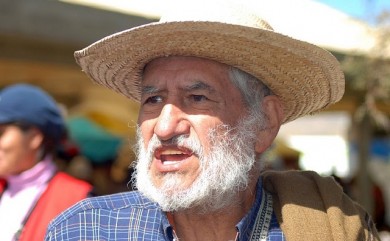Hugo Blanco of course will never retire! Viva Hugo!
'Sub-Commander Marcos -- whose identity is not publicly known -- has not died in the usual sense. Rather, the individual known as Marcos has withdrawn from that role for reasons stated here'
Lucha Indigena Editorial Hugo Blanco
'Sub-Commander Marcos -- whose identity is not publicly known -- has not died in the usual sense. Rather, the individual known as Marcos has withdrawn from that role for reasons stated here'
Lucha Indigena Editorial Hugo Blanco
THE DEATH OF ZAPATISTA SUB-COMMANDER MARCOS
The hierarchical society that is crushing us cannot
imagine a horizontal society in which there is no chief and decisions are made
collectively. On three occasions the
Zapatista native communities have collectively organized and directed
mini-schools (escuelitas). This
is carried out with such efficiency that thousands of students from many
countries have been able to learn how a new world is being built.
When
Marcos stopped appearing in public, the vertical system's press and
spokespeople said that he must be either sick or dead. Marcos, himself, contributed to this
conclusion by admitting to several zapatologists (i.e. intellectuals with
specialist knowledge of the Zapatista movement that he had been ill, asking
them not divulge this information. This
was of course the best means of getting the news out. ("It's a secret. Don't tell anyone.")
The
following quotations and comments together serve as a synthesis of the
Zapatista outlook.
"Against death, we demand life. Against silence, we call for the word and
respect. Against forgetting,
memory. Against humiliation and
contempt, dignity. Against oppression,
rebellion. Against slavery,
freedom. Against dictatorship,
democracy. And against crime,
justice."
"Through the war that we are waging, we have been
privileged to come to the attention and generous hearts of people both near and
far."
After
the shooting stopped, the war continued.
It was the furious war of neoliberalism against humanity. The put the Zapatistas in a dilemma. Either they prepared for war or they
concentrated on building a new world.
They chose the second option, as has been witnessed by thousands of
graduates of the mini-schools. There
they teach democracy, freedom and justice, as well as wholesome nutrition, good
health and education.
"In
the course of these 2 years a complex, multi-dimensional picture of the EZLN
has emerged."
"At
the start of the uprising, those who today are pursuing the struggle and
directing the resistance were still small or not yet born."
Besides
age, there are other dimensions that show signs of progress. "The dimension of class: moving from the
educated middle class to the native peasantry.
That of race: from a mainly mestizo movement to one more purely
native. And, most importantly, that of
attitude: from revolutionary vanguardism to commanding by obeying; from
taking power from above to creating power from below; from professional
politics to the politics of everyday life; from leaders to the peoples; from
the marginalization of women to their direct participation; from mocking those
who are different to celebrating our differences."
"Why are they so terrified at the sight of the
people governing themselves and directing their own footsteps? ...
The cult of the individual finds its most fanatical expression in the
cult of vanguardism."
"And
it has been precisely this, the native people in control and a native as
representative and spokesperson, that they find so frightening and
confusing. It drives them to keep
looking for someone who can identify the vanguards, chiefs and leaders. After all, there is also racism on the Left,
especially that part of it that claims to be revolutionary."
"If only they could see who small they are. We must ensure that they understand their own
insignificance."
"In
this way a complex maneuver of distraction was undertaken, a dreadful and
amazing magic trick, a malicious trifling with our native heart. The native wisdom was challenging modernity
in of its very bastions, the news media."
"This
was how the personality known as Marcos began to form."
"We
needed time to be ourselves and to find those who would know to see us as we
are."
"The people had made impressive advances at the
core of the movement. Then came the
course of instruction on 'The Zapatista Road to Freedom". ... We
became aware that there now existed a generation that could look us in the
face, that could listen to us and speak without waiting for guidance or
leadership, without claiming either to submit or to follow."
"
The Zapatista struggle had arrived at a new stage, and Marcos the personality
was no longer needed."
So it was that Sub-Commander Marcos passed from among
us.




